State Bar’s limits on financial transparency create budgetary blind spots
By: James Briggs, [email protected]//December 19, 2011//
State Bar’s limits on financial transparency create budgetary blind spots
By: James Briggs, [email protected]//December 19, 2011//
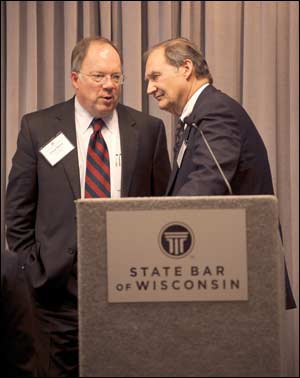
To practice in Wisconsin, lawyers are required to pay $224 a year in State Bar dues, but that doesn’t buy them a meaningful look into how bar leaders spend the money.
However, rank-and-file lawyers shouldn’t feel too deprived; even members of the State Bar of Wisconsin’s Board of Governors and Finance Committee are in the dark about some of the bar’s expenditures.
The lack of access to specific staff member salaries or program information creates a fiscal blind spot that puzzles governors such as Steven Levine, a Madison attorney.
Levine said he has no reason to think staff members are overpaid, but he also thinks the State Bar’s governors and Finance Committee members could make better decisions if they had more information.
“With any organization, if you want good employees and want a good director, you’re going to have to pay a good salary,” Levine said, “but I figure that should be open.
“I don’t know why they’re keeping that secret.”
The State Bar straddles a line between being a state agency, under the jurisdiction of the Supreme Court, and a private corporation, which is not compelled to share financial information even with the people elected to govern it.
“The State Bar has a schizophrenic identity,” Levine said. “When it comes to the advantages of being a state entity, or something like a state agency, they claim to be a state agency.
“But when they want to act in private or in secret and avoid all public requirements state agencies are required to follow, they say they’re just a private organization.”
Even George Brown’s executive director salary is officially unknown to all but members of the State Bar’s Executive Committee.
Bob Dreps, an attorney who has represented the Wisconsin Newspaper Association, said the State Bar is not subject to open records requests and would prevail if anyone attempted to sue for access to financial information.
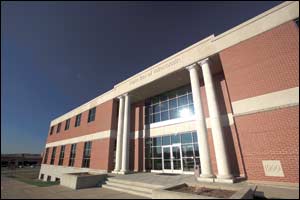
There are several elements that define a government entity, Dreps said, with “the principal one being whether it’s performing a government function. On that one, I think the State Bar would founder.
“I certainly understand the state mandates all lawyers to belong to it,” Dreps added. “That’s been controversial all of the 30 years I’ve been a lawyer.
“In the end, it’s not that directly tied to government. There are no government officials who run it. Regulating the State Bar is a function of the state Supreme Court, and the bar certainly cooperates in that, but in many respects it’s adversarial to the Supreme Court.”
A 2008 state Supreme Court case, State of Wisconsin v. Beaver Dam Area Development Corp., clarified the distinction between private and government entities. The State Bar, Dreps said, clearly operates on the private side of the line.
But, Dreps added, legal definitions don’t explain why the State Bar chooses relative secrecy. Dreps was surprised, he said, to learn dues-paying members do not have access to information about how the State Bar spends its money.
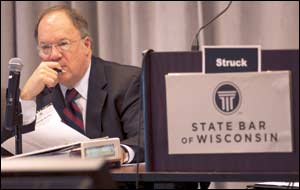
“We have a right to know and should be more informed,” he said. “I mean, that is very troubling considering it’s a mandatory membership obligation. I’m sure they have their reasons.”
Whatever the official reasons are, though, the State Bar did not provide them for this story.
Brown declined in person to be interviewed Dec. 2 at a Board of Governor’s meeting in Madison.
Thomas Solberg, a spokesman for the State Bar who retired Dec. 9, said Brown has been too busy to grant interviews.
“George is just about impossible to reach right now,” Solberg said.
The Wisconsin Law Journal also asked Solberg a series of questions relating to the State Bar’s finances, but Solberg did not respond with answers.
Margaret Wrenn Hickey, chairwoman of the State Bar’s Finance Committee, also said in person she didn’t have time to answer questions Dec. 2. She did not respond to subsequent requests for comment.
Doug Kammer, a past president of the State Bar, said he also failed to find answers to questions about why the State Bar doesn’t provide more financial information to members, or at least to the organization’s leadership.
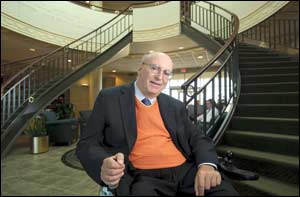
“The Board of Governors has no idea what they’re voting for,” Kammer said. “When it comes down to the last $300,000, when they’re deciding how much to spend on paper clips, the Finance Committee stretches and strains and agonizes over it, but the first $11 million disappears off the table with no oversight.”
Staff members’ salaries and benefits for the State Bar’s nearly 100 employees account for about 63 percent of the $11 million budget, but Kammer said he repeatedly was denied access to more detailed information during his 2009-10 term as president.
A recently drafted policy states access to personnel information, including compensation, is “limited to examination by the affected employee and by the executive director, staff directors and human resources and administrative managers of the State Bar of Wisconsin.”
Eventually, Kammer said, Brown offered access to salary figures if Kammer agreed to sign a nondisclosure agreement, which he declined to do.
John Byrnes, a Virginia attorney who is an out-of-state member, resigned from the Finance Committee in April, stating in a letter that “members of the bar cannot and should not assume use of their money is carefully reviewed by the finance committee.”
Byrnes cited not only a lack of access to staff compensation figures, but also the 2011 budget approval process, during which the Finance Committee was asked to approve the capital budget without seeing the full budget.
The capital budget, Byrnes said, totaled $840,000, including $600,000 to reconstruct the State Bar’s information technology system. When the full budget went before the Finance Committee, Byrnes said, it became clear the State Bar was working with a $363,728 deficit, for which it had to tap reserves.
“We approved the capital budget that, if the regular budget had been approved as presented, would have resulted in a very large deficit — so large that, in my opinion, the capital budget would not have been approved,” Byrnes said. “And, as a result of that, we had to invade in a significant manner a couple of the reserve funds to avoid a dues increase.”
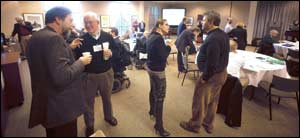
Byrnes, in his resignation letter, laid out a series of recommendations to make the State Bar more fiscally sound.
Among them, Byrnes suggested, the State Bar should let the Finance Committee hire its own accountant; require the executive director provide in the budget written justification for all expenses; and let the Finance Committee review all staffing levels and assignments.
The Finance Committee’s Hickey in June disputed Byrnes’ assessment that the budget process was broken and said “we’ll look at (his suggestions) and see if there is reason to do more and then report back to the board.”
So far, Byrnes said, he has seen little evidence that his suggestions have been considered.
“You won’t really be able to tell until the actual budget cycle commences,” he said. “And that doesn’t commence until the first part of the year.”
Byrnes, though, is hardly the first person to suggest changes. Milwaukee attorney Nicholas Zales, a former chairman of the Finance Committee, in 2009 proposed posting online detailed information about how the State Bar spends money.
The proposal failed.
“As chair of the Finance Committee, I had to work very hard to understand how our money was being allocated,” Zales said. “In this tough economy, you want to make sure you’re getting the most bang for your buck.
“I do believe the bar does a good job in how it spends money, but the transparency issue is a puzzling one to me because there’s no reason not to provide more information to our members.”
The problem, though, Zales said, can’t simply be characterized as a select group of State Bar officials fighting against transparency. He said he never had access to specific staff member salary information, but in 2009 he presented an aggregate of seven years worth of compensation broken down into salaries, benefits and health insurance.
“I’ve got to tell you, honestly, I provided this information, but not everybody was interested in it,” Zales said. “They were interested in the overall budget. As for members, I know some of them are very vociferous and want to know everything, but the vast majority of members aren’t interested in it. They just want to know when they’re getting their dues statement.”
Zales wishes members and leadership would agree to make the State Bar more transparent, he said, but added it’s necessary to keep some information private.
“Financial disclosure to our members is very important, and we should do as much as we can,” Zales said. “But we shouldn’t hamstring the bar with people making constant (open records) requests. That could harm the bar in terms of (Continuing Legal Education) programs because that is a business, and we rely quite heavily on that to fund operations.”
As a business, the State Bar is proving vulnerable to economic conditions, operating with a year-to-date deficit of $209,198, Hickey told the Board of Governors on Dec. 2. The organization will have to make tough choices, she said.
“We obviously want to manage a balanced budget and, unfortunately, you heard about requesting voluntary staff separations,” Hickey told the board. “Ok, that’s another word, I think, kind of like a layoff.
“We are going to have to struggle with this as the year goes along, what we’re going to do. We are going to have to look seriously at Finance about either staff cuts or ways to increase revenue, and you guys already know one of those ways is to sell more things and another way is to perhaps raise dues.”
The question remains, though, whether the Board of Governors has enough information to make the best decisions for its membership, Byrnes said.
“I think that no one could say whether a dues increase is warranted or not,” Byrnes said, “because there’s nobody who understands exactly what the State Bar of Wisconsin is and what it’s supposed to do.”
Read more from the State Bar
- WILL: State Bar of Wisconsin to end DEI practices; State Bar: No changes other than diversity definition
- State Bar of Wisconsin Board candidates silent on issues
- State Bar of Wisconsin sued over diversity program in new federal lawsuit (UPDATE)
- Wis. Attorney General Kaul: State Bar has good process in place when lawyers face criminal charges
- Citing Wisconsin case, SCOTUS declines challenge against Mich. State Bar
- Hickey to serve as State Bar president-elect
- Briggs committed to increasing diversity of Wisconsin’s legal profession
- State Bar launches Pro Bono Opportunity Portal
- Supreme Court holds public hearings for client protection fund fee increase, judicial code updates
- 2020 law school graduates, students cope with unprecedented pandemic fallout
Legal News
- Milwaukee Police investigating fatal downtown crash
- Milwaukee drops security personnel ordinance
- Wisconsin Supreme Court tacks on additional months to already suspended lawyer
- Supreme Court: Abortion protester’s First Amendment rights violated
- These doctors were censured. Wisconsin’s prisons hired them anyway
- Ruling reinstates lawsuit over ‘Black Lives Matter’ school posters
- Wisconsin Supreme Court to consider whether 175-year-old law bans abortion
- Wisconsin man facing bestiality and felony bail jumping charges
- Waukesha County woman indicted in National Health Care Fraud Law Enforcement Action
- Man sentenced to 15 months for fraud involving luxury vehicles
- Wisconsin Department of Justice Fire Marshal investigating fire that killed six
- Ozaukee County first responders save family of three, father and son on Milwaukee River
Case Digests
- Termination of Parental Rights
- First Amendment Rights
- Termination of Parental Rights
- Late Filing
- Real Estate-Attorney Fees
- Ineffective Assistance of Counsel
- Variance-Interpretation of Zoning Ordinances
- Sentencing
- Fourteenth Amendment’s Due Process Clause-Jury Instructions
- Unlawful Collection Practices-Evidence
- Sentencing-Vindictiveness
- Prisoner Grievances-Exhaustion of Administrative Remedies











